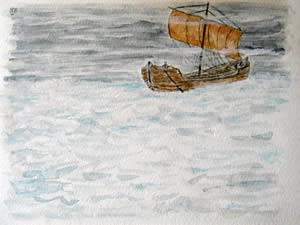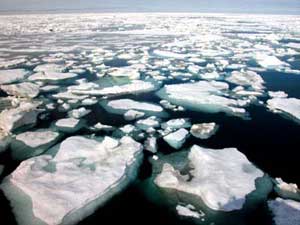And Pytheas ventures even further north to distressing places, where the cold pierces the bones, and where "one can neither walk nor sail."
In Thule, he learns that, a day's journey north, the sea has a very curious appearance. Pytheas, the scientist that he is, is very intrigued by this. He convinces the local sailors to take him to see this phenomenon.
 |
The frozen sea |
A first text by Strabo does not tell us (N56). But other passages describe it better. Pliny, with this simple sentence: "A day's journey from Thule, towards the Frozen Sea that some call Cronian." (N57). Polybius tells us: "of those places where neither the earth had any existence, nor the sea, nor the air, but a sort of mixture of these things like a sea lung in which the earth and the sea and all these things are together in suspension, and as if it were a link between all, these things existing in a form in which one can neither walk nor sail." (N58.1), and Strabo adds: "The thing like a sea lung he says he saw, but the other things he speaks of by hearsay." (N58).
What could Pytheas have seen? Probably the place where the first ice forms. In these confines, there are days without wind, when the temperature drops quickly, especially when you approach the cold current coming down from the north, which passes northwest of Iceland. The sea is very cold, while the air coming from the south is warmer, which often causes fog.
The current carries the debris of the ice floe that broke up in the summer, coming from the far north. The ice is very tight, which means that the surface of the sea becomes almost smooth, simply rocked by the slow rhythm of the swell. This is the pack.
 |
The Pack |
It presents itself as an often impassable barrier, even today, when the temperature has risen by a few degrees compared to Pytheas' time. The pack ice, in summer, extends along the entire east coast of Greenland, with a width that sometimes reaches 200 km. Strabo says that Pytheas himself saw the sea lung (ice floe or jellyfish), but that for the rest, he had only heard about it. As if one could go to the ice floe without having passed through Northern Europe! Strabo is caught red-handed in denial.
It is now time for Pytheas to turn back and return to Marseille. The first part of his journey is over.
.

